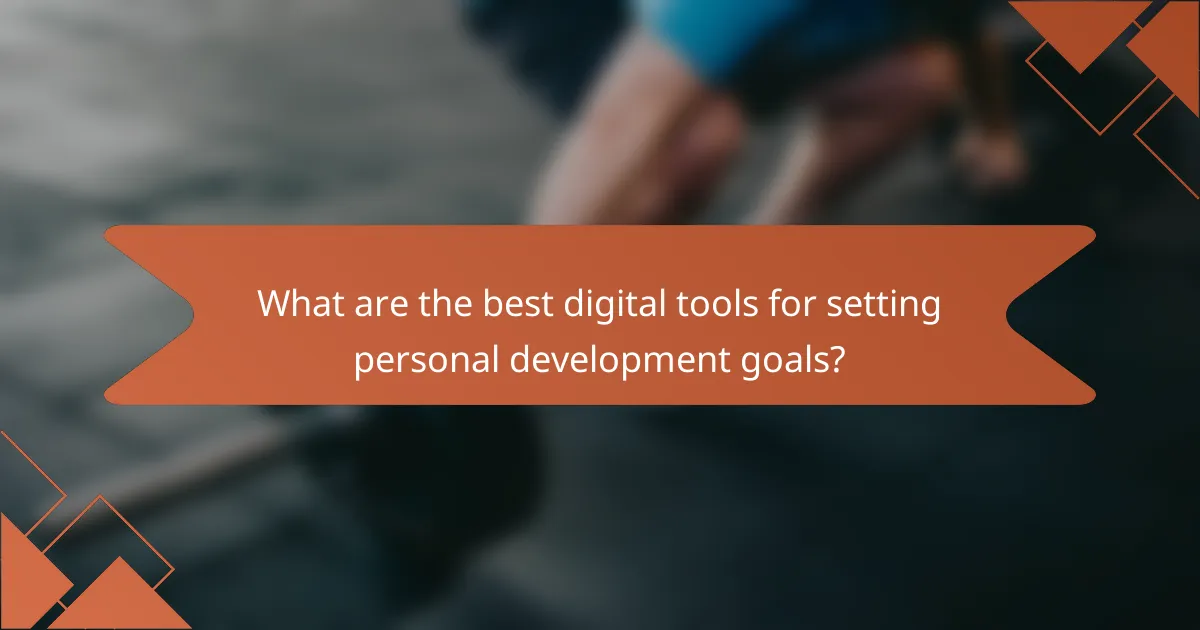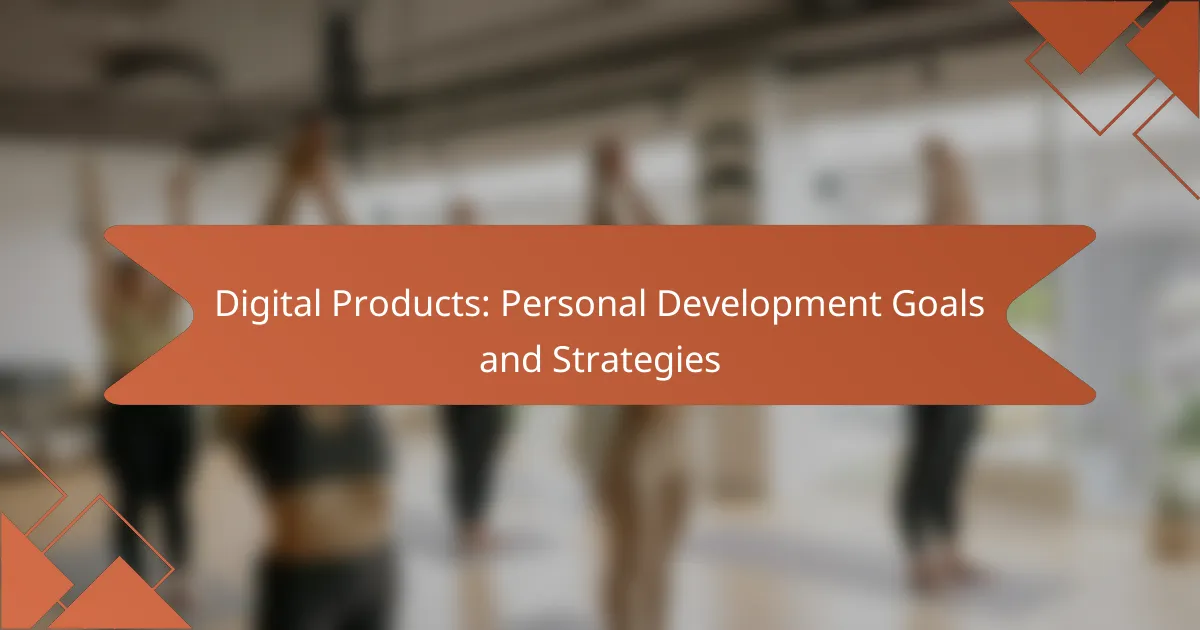In today’s digital age, personal development goals can be effectively achieved through the use of tailored digital products that enhance skills and productivity. These tools provide accessible resources that allow individuals to set specific, measurable objectives while tracking their progress. By leveraging the right applications, users can cultivate meaningful connections and adopt new habits that align with their growth aspirations.

What are effective personal development goals for digital products?
Effective personal development goals for digital products focus on enhancing skills, improving productivity, and fostering meaningful connections. These goals should be specific, measurable, and aligned with your overall objectives in the digital landscape.
SMART goals framework
The SMART goals framework is a powerful tool for setting effective personal development goals. SMART stands for Specific, Measurable, Achievable, Relevant, and Time-bound, which helps ensure that your goals are clear and reachable. For example, instead of saying “I want to learn coding,” a SMART goal would be “I will complete an online Python course within three months.”
When using the SMART framework, regularly review your progress and adjust your goals as needed. This adaptability can help maintain motivation and ensure that your objectives remain relevant to your evolving needs.
Skill acquisition targets
Setting skill acquisition targets involves identifying specific skills you want to develop for personal or professional growth. This could include mastering a new software tool, improving your design abilities, or enhancing your data analysis skills. Aim for a balance between foundational skills and advanced techniques to create a well-rounded skill set.
Consider breaking down larger skill goals into smaller, manageable milestones. For instance, if your target is to become proficient in graphic design, you might set milestones like completing a beginner’s course, creating a portfolio piece, and receiving feedback from peers.
Time management objectives
Time management objectives are essential for maximizing productivity in personal development. These goals can include prioritizing tasks, setting deadlines, and allocating specific time blocks for focused work. For example, you could aim to spend two hours each day on skill development without distractions.
Utilizing tools like calendars or task management apps can help you stay organized and accountable. Regularly assess your time management strategies to identify areas for improvement, such as reducing time spent on low-priority tasks.
Mindfulness practices
Incorporating mindfulness practices into your personal development goals can enhance focus and reduce stress. Techniques such as meditation, deep breathing, or journaling can help improve your mental clarity and emotional resilience. Aim to dedicate a few minutes each day to mindfulness activities to cultivate a more balanced mindset.
Consider setting specific mindfulness goals, such as practicing meditation for ten minutes daily or attending a weekly mindfulness workshop. These practices can support your overall personal development journey by fostering a greater sense of awareness and presence.
Networking strategies
Effective networking strategies are crucial for personal development in the digital space. Building relationships with peers, mentors, and industry professionals can open doors to new opportunities and insights. Set goals for attending networking events, joining online communities, or reaching out to individuals in your field.
To enhance your networking efforts, consider creating a plan that includes specific actions, such as connecting with three new contacts each month or participating in relevant online forums. Consistent engagement is key to building a strong professional network that supports your growth.

How can digital products enhance personal development?
Digital products can significantly enhance personal development by providing accessible resources and tools tailored to individual growth goals. They offer flexibility in learning and tracking progress, making it easier to adopt new skills and habits.
Online courses for skill development
Online courses are an effective way to acquire new skills or deepen existing knowledge. Platforms like Coursera and Udemy offer a wide range of subjects, from coding to creative writing, often at affordable prices, sometimes even free. Consider setting specific learning goals, such as completing a course within a month, to maintain motivation.
When selecting a course, check for user reviews and course completion rates to gauge its effectiveness. Look for courses that offer practical assignments and community support, as these elements can enhance your learning experience.
Mobile apps for habit tracking
Mobile apps designed for habit tracking can help you establish and maintain positive routines. Apps like Habitica or Streaks allow you to set daily goals and monitor your progress, making it easier to stay accountable. Aim to track habits consistently for at least 21 days to establish them effectively.
Choose an app that aligns with your personal preferences and lifestyle. Some apps offer gamification features, which can make habit tracking more engaging. Be cautious of overloading yourself with too many new habits at once; focus on a few key areas to start.
E-books for self-improvement
E-books provide a convenient way to explore self-improvement topics at your own pace. Platforms like Kindle and Apple Books offer a vast selection of titles covering everything from time management to emotional intelligence. Consider setting aside dedicated reading time each week to make consistent progress.
When selecting e-books, look for those with actionable advice and practical exercises. You might also want to join online book clubs or forums to discuss insights and share experiences, which can enhance your understanding and motivation.

What are the best digital tools for setting personal development goals?
The best digital tools for setting personal development goals include applications that help you manage tasks, organize notes, and track progress. Utilizing these tools can enhance your productivity and ensure you stay focused on your objectives.
Asana for project management
Asana is a robust project management tool that allows users to create, assign, and track tasks within various projects. It is particularly useful for setting personal development goals as it provides a clear visual layout of your tasks and deadlines.
To effectively use Asana, start by breaking down your goals into smaller, manageable tasks. You can set deadlines, prioritize tasks, and even track your progress over time. This structured approach helps maintain focus and accountability.
Evernote for note-taking
Evernote is an excellent tool for capturing ideas, notes, and reflections related to your personal development journey. It allows you to organize your thoughts in notebooks and tag them for easy retrieval.
When using Evernote, consider creating a dedicated notebook for your personal development goals. Regularly jot down insights, lessons learned, and resources that inspire you. This practice not only keeps your thoughts organized but also serves as a motivational reference.
Trello for task organization
Trello is a flexible task organization tool that uses boards, lists, and cards to help you visualize your goals and tasks. It’s particularly effective for tracking progress on personal development projects in a straightforward manner.
To get started with Trello, create a board for your personal development goals and add lists for different stages, such as “To Do,” “In Progress,” and “Completed.” This visual representation allows you to see your progress at a glance and adjust your strategies as needed.

What criteria should I consider when choosing digital products for personal development?
When selecting digital products for personal development, consider user reviews, content quality, and cost structures. These factors will help ensure that the product meets your needs and delivers value effectively.
User reviews and ratings
User reviews and ratings provide insight into the effectiveness and reliability of a digital product. Look for platforms where users share their experiences, as high ratings often indicate a product that delivers on its promises.
Pay attention to both the quantity and quality of reviews. A product with hundreds of positive reviews is generally more trustworthy than one with only a few ratings, even if the latter has a higher average score.
Content quality and relevance
Assess the content quality and relevance to your personal development goals. Ensure that the material is created by credible experts and is up-to-date with current trends and practices.
Consider whether the content is engaging and interactive, as this can enhance your learning experience. Look for samples or previews to gauge if the style and depth align with your preferences.
Cost and subscription models
Evaluate the cost and subscription models of digital products. Some may offer one-time purchases, while others operate on a subscription basis, which can range from monthly to annual fees.
Consider your budget and how often you plan to use the product. A subscription might be more economical if you intend to access ongoing content, while a one-time purchase could be suitable for a specific course or material.

What are common challenges in achieving personal development goals?
Common challenges in achieving personal development goals include lack of clarity, insufficient motivation, and poor time management. These obstacles can hinder progress and lead to frustration, making it essential to identify and address them effectively.
Lack of clarity in goals
A lack of clarity in personal development goals can result in confusion and aimlessness. When goals are vague or poorly defined, it becomes difficult to create actionable steps toward achieving them. To combat this, use the SMART criteria—specific, measurable, achievable, relevant, and time-bound—to refine your goals.
For example, instead of setting a goal to “get fit,” specify “exercise for 30 minutes, five times a week for the next three months.” This clarity provides a clear direction and helps track progress.
Insufficient motivation
Insufficient motivation can derail even the best-laid plans for personal development. When individuals lack the drive to pursue their goals, they may procrastinate or abandon them altogether. To boost motivation, identify personal reasons for pursuing each goal and visualize the benefits of achieving them.
Consider joining a support group or finding an accountability partner to maintain motivation. Sharing progress and challenges can create a sense of community and encourage persistence.
Poor time management
Poor time management is a significant barrier to achieving personal development goals. Without effective prioritization and scheduling, it can be challenging to allocate time for self-improvement activities. To improve time management, create a daily or weekly planner that includes dedicated time slots for working on your goals.
Utilize tools like digital calendars or task management apps to set reminders and deadlines. Aim to break larger tasks into smaller, manageable steps to avoid feeling overwhelmed and to maintain steady progress.
